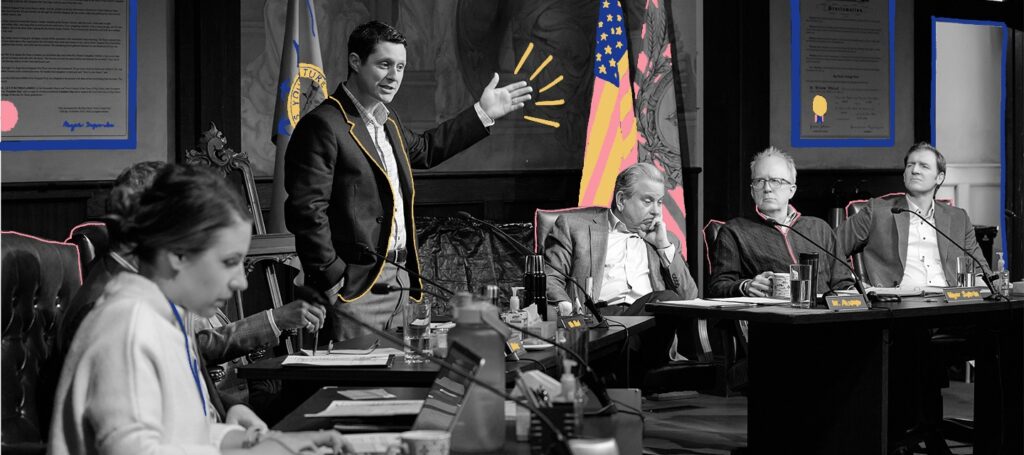


The Thrilling ‘The Minutes’ Finds Pleasure in the Tedium of Politics
There is no swifter cure for political idealism than watching a government meeting. If you are ever feeling swept up in romantic notions about public service, turn on C- Span or your local government channel, and they will knock The West Wing straight out of you. Instead of rousing speeches, you will be subject to confused questioning, logistical ramblings, and an endless soundtrack of paper rustling and throat clearing. As you watch the events unfold, you might find it hard to believe that decisions of consequence are actually made in such underwhelming environments.
This paradox is at the center of Tracy Letts’ sly and unsettling new play, The Minutes. Originally produced in 2019 by the Steppenwolf Theater Company, this riveting production reunites Letts with his longtime collaborator, director Anna D. Shapiro. The ensemble boasts a formidable array of New York and Chicago actors (including Letts himself).
The Minutes centers on a city council meeting in the fictional town of Big Cherry. Mr. Peele (Noah Reid), the newest member of the Cherry Creek Council, arrives eager to learn what he missed at the previous session. He is greeted by Mayor Superba (Letts) and other members with indifference and vague niceties. As the meeting begins, the council hears several issues ranging from stolen bikes to an upcoming heritage festival. Peele learns that one member, Mr. Karp, abruptly left the council after the previous meeting. Confused, Peele probes the other members for answers only to discover that the minutes from the previous meeting are not readily available, so he becomes determined to find answers.
The Minutes is a piece as mysterious as it is ferociously entertaining. Among the play’s many pleasures is the humor it finds in the tedium of politics. Letts deftly captures the absurdity, confusion, and passive aggression that animates these gatherings.He understands his characters’ hangups and delusions and mines both delightfully. Watching the characters spar, I felt the jolt of energy that only the sharpest political satires give me.
But Letts’ intentions are ultimately even richer. As the play unfolds, the dynamics become more visibly fraught. We see the men in the room quietly undermine the women on the council. We hear progressive proposals be framed as logistical inconveniences. And we watch Peele’s demands for answers be met with hostility. Letts subtly highlights these behaviors during the initial scenes, giving the audience the opportunity to chase their laughs with some squirms. Eventually, those behaviors fester and take over.
Suddenly, the banality of the proceedings feels all the more menacing. Are the council members complicit in a major cover-up? Which narratives are completely fabricated? And why did Mr. Karp leave? It is in these considerations that The Minutes finds its singular fire. The play is interested in the violence that lurks within our institutions, nestled behind the niceties and procedures. A violence that is continually erased, obscured, and excused by those in power.
The play’s thorny considerations feel electric because of its physical production. The sophistication of Letts’ writing is especially matched by Shapiro who brilliantly manages the play’s tone, allowing the evening to seamlessly move from droll comic realism to elevated farce to surreal nightmare. Her work is lucid and simple, building a world that is both tangible and eerie.
This world is given exquisite life by an exemplary cast, who move so harmoniously that it feels impossible to single specific standouts. The play requires a complete lived-in immersion from its ensemble and each performer achieves this while also finding specificity and dynamism in their respective parts. Their work is meaningfully aided by David Zinn’s set, which perfectly captures the aesthetic of local government buildings, including their frequent allusions to the American mythos ( the meeting room is adorned with both an eagle design and red, white, and blue coloring), and Brian MacDevitt’s lighting, which adds an element of beguiling strangeness to the piece.
Yet none of these elements prepare you for the journey you will be on. As tensions arise and revelations unfold, the play moves to a startling crescendo. It is an unexpected ending (one that this critic would never spoil), but like most worthwhile productions, it leaves a provocation for the audience to wrestle with long after they’ve left the theater. I know I will be thinking about The Minutes for a long time.
Keep Reading

In ‘American Buffalo’ Nostalgia Gets in the Way of Progress
Somewhere in America older men impart wisdom to the younger between puffs of smoke and swigs of Coke. Somewhere in America, life is a powder keg with a short fuse, and morality is but an afterthought, as is breakfast. Somewhere in America, everything hinges on a coin. At the center of American Buffalo, David Mamet’s […]
Read More
A Diluted ‘Little Prince’ Leads to Disenchantment
There was a child seated behind me at the Broadway Theatre the evening I attended The Little Prince. The boy was roughly the age I was when I first learned of Antoine de Saint-Exupéry’s exceedingly charming, poignant, heartbreaking tale. The child was getting excited, asking questions, enthralled by the pretty rainbow lights filling the space, […]
Read More












